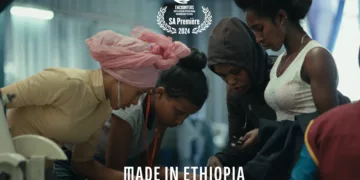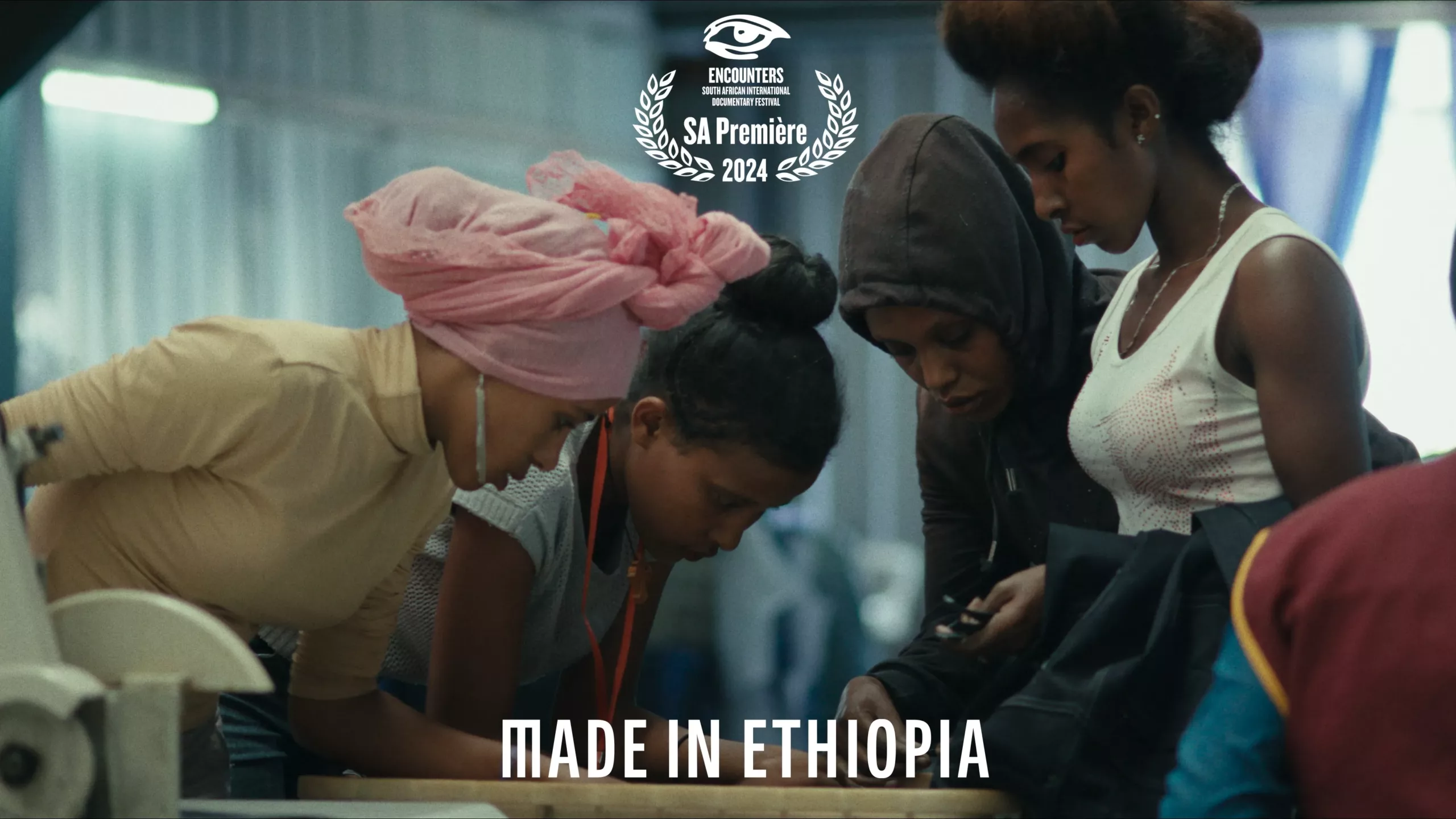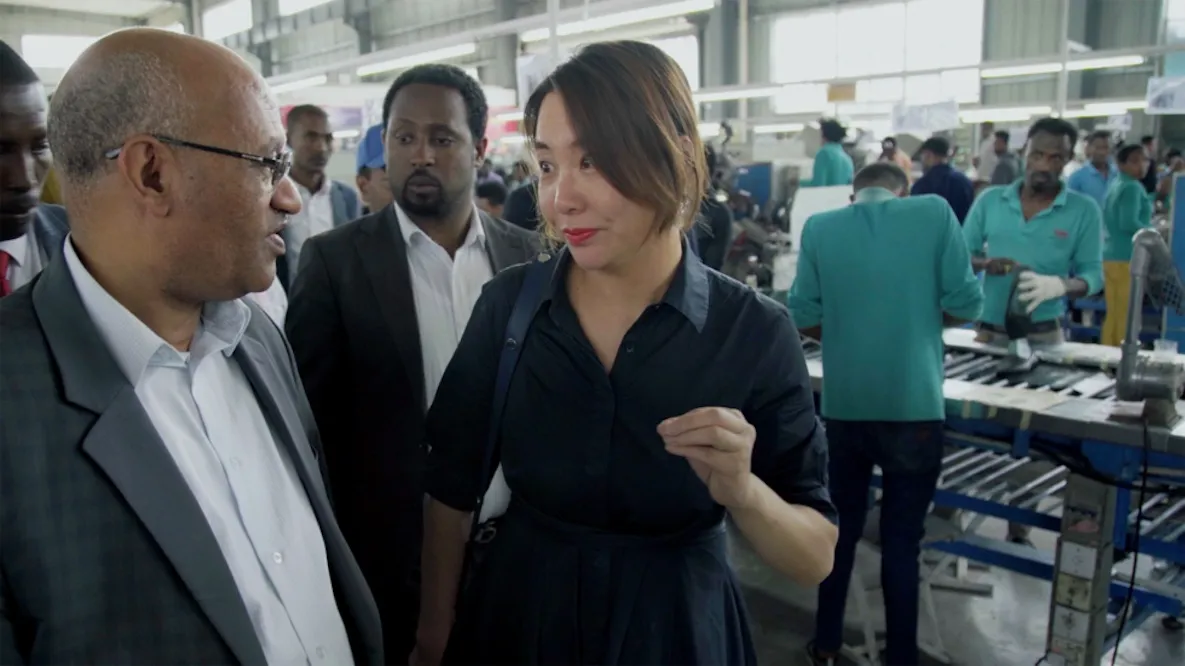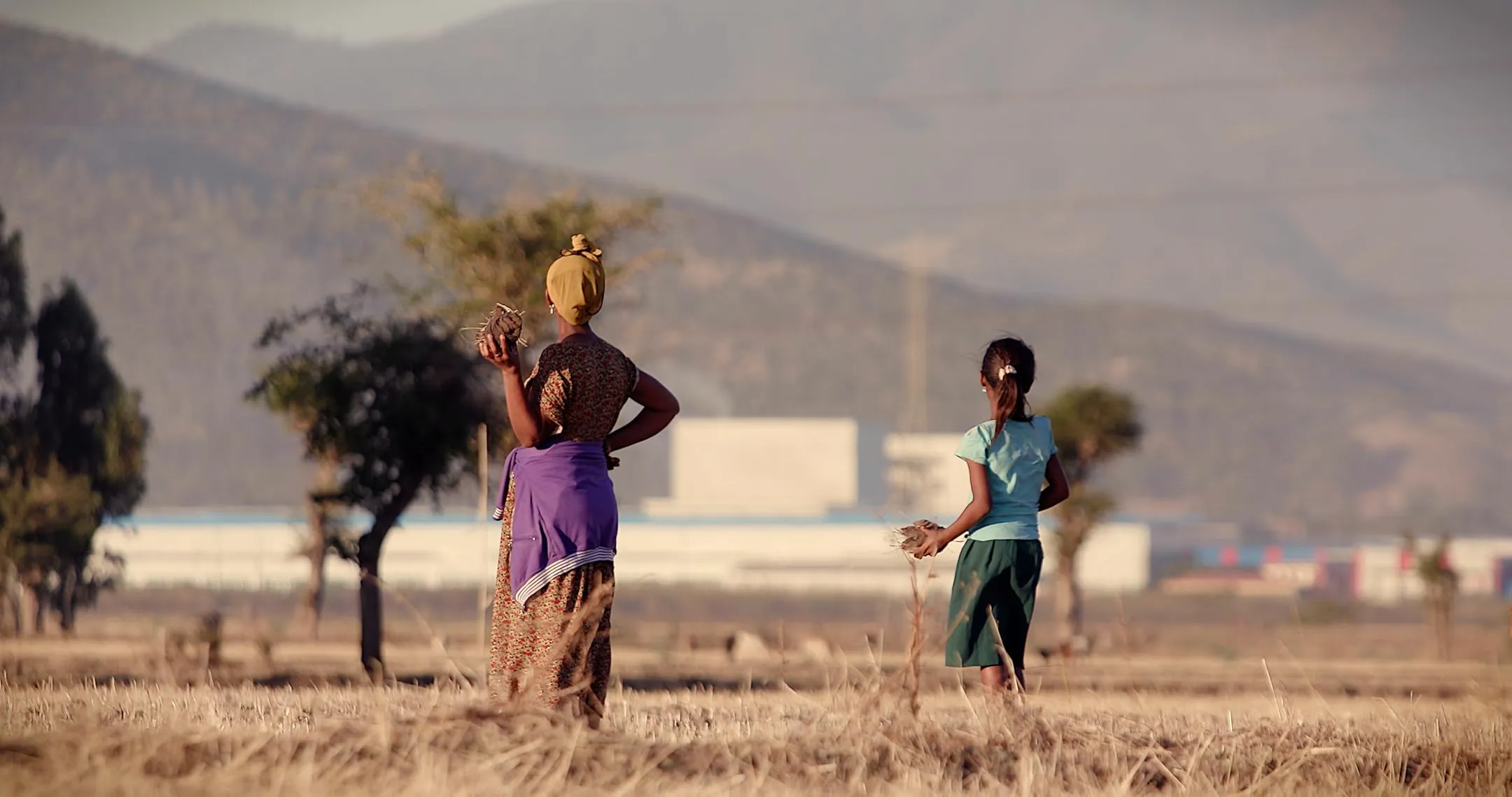Set in the rural Ethiopian town of Dukem, Made in Ethiopia immerses us in the lives of three key figures amidst the changes brought about by a burgeoning Chinese industrial complex. Motto is the no-nonsense director of Eastern Industry Park, striving tirelessly to expand its factories and workforce. As a businesswoman, she sees only opportunity where others see disruption. Yet even her unflagging work ethic cannot fill the void of family back in China.
We also meet Beti, a factory worker with dreams that seem ever out of reach on her meager salary. Though she finds purpose in her work, it prevents the education she hopes will lead to better things. Despite challenges, glimmers of intercultural friendship shine through between Beti and her Chinese supervisor.
The film also introduces us to farmer Workinesh and her family. Where industry expands, their ancestral land disappears—and so too the livelihood they had relied on for generations. Yet even in upheaval, Workinesh draws resilience from close community ties and her determination to pave a new path.
Across divides of nationality and class, these three women’s stories reveal shared hopes and hardships. Under the directors’ sensitive gaze, Made in Ethiopia depicts both the opportunities and tensions arising from China’s growing investment in the region. It is a nuanced portrait inviting us to step into others’ shoes and understand the complex realities behind impactful global changes.
Insights from an Industry Insider
Following businesswoman Motto Ma provides fascinating insight into Ethiopia’s burgeoning industrial sector. As deputy director of Eastern Industry Park, no task is too big for the ambitious Motto. She enthusiastically guides potential investors around cemeteries and textile plants, glowing with pride in the complex’s success.
For Motto, the Park’s expansion symbolizes opportunity—a chance to bring more jobs and her vision of prosperity to Dukem. But grand plans often raise difficult questions. When Motto sets her sights on a new phase occupying local farmland, she faces stubborn resistance from farmers left stranded by broken government promises.
Juggling negotiations with local officials and angry landowners, the pressure mounts on Motto. Yet for all her passion, responsibility weighs heavy. Family remains half a world away in China, a distance only widened by Motto’s all-consuming work. Though her efforts shape Ethiopia’s future, being away from her own daughter comes at no small cost.
Through Motto’s tireless efforts, we witness both practical challenges and personal sacrifices intrinsic to her role. Her optimism, while sometimes dismissive of local realities, seems fueled by a genuine belief in industry’s power to uplift lives. More than a one-dimensional business persona, Motto emerges as a complex woman navigating cultural crossroads—aand reminding us that behind every bold ambition lies a full humanity.
Hopes and Hustle on the Workshop Floor
The assembly lines of Eastern Industry Park see many hardworking souls, but none perhaps with dreams as ambitious as young Beti. A factory worker sewing trousers endlessly, she hopes each day brings her closer to studying engineering—if only her meager wage would allow it.
Welcoming the cameras into her world, Beti shares the grit and graft of her routine. Long shifts and short breaks fill her days, yet her mind remains set on elevating beyond the workshop floors. Though prospects seem slim, her spirit stays strong.
An unlikely spark of kinship emerges when Beti befriends Mila, a Chinese supervisor. Beyond barriers of language and culture, they find solidarity in swapped stories of home. Both struggle with absence from family in the pursuit of opportunity.
Beti’s drive shows the factory’s promised “progress” falls far from the locals’ reality. While new jobs have come, they fail to lift workers to dreams unreachable on poverty pay. Her fight to study hints at how industrialization, while delivering wealth elsewhere, leaves some grasping for greater change.
Through Beti’s honest reflections, we glimpse factory life’s grind—and the human hopes that make its hardships bearable. Hers is a story of resilience, reminding us determination sometimes outlives even the longest of odds.
Standing Her Ground
The arrival of Eastern Industry Park cast an imposing shadow over Workinesh’s farm. Where she once grew crops, gray factories now towered—built upon promises unkept.
Like others, Workinesh’s family saw their land seized by authorities. In exchange, only lies were given regarding replacement fields. Left with nowhere to turn, an uncertain future threatened Workinesh’s hardest-earned stability.
Yet this mother found resolve in the community. When business negotiations brought confrontation, Workinesh stood tall alongside neighbors equally displaced. Despite pressure applied, her conviction held firm—no work would start till the government granted the lands owed.
Within Workinesh’s village endured traditions tying people to place. But she recognized a world increasingly at odds with her rural ways of life. Seeking security for daughter Rehoboth, Workinesh guided the girl toward dreams not tethered to ancestral ground.
Their interwoven stories, captured through intimate moments of resilience, lent vital perspective on changes shaking Ethiopia’s landscape. Workinesh’s determination, as she faced complex challenges with steadfast hope, revealed common humanity amid disagreement over how a nation might progress.
Her role ensured filmmakers conveyed local realities beyond surface clashes. In Workinesh, we met a woman empowered to author her family’s future—even when all else seemed beyond her control.
Beyond surface differences
On its face, Eastern Industry Park seemed a world of disparate cultures. Views of worklife clashed as Motto pushed expansion while locals protested altered ways.
Yet probes beneath surface contrasts revealed far more uniting the community than divided. Whether ambitious businesswoman or farmer fighting displacement, each lady’s drive stemmed from familial love stretching across borders.
Motto hoped industry’s growth might deliver futures brighter than her daughter’s lonely upbringing allowed. Her vision, though dismissive of local costs, came from motherhood’s yearnings, not malice.
Similarly Workinesh battled not change itself but how it stole her role sustaining kin. Familial duty motivated resistance to powers threatening stability once taken for granted.
Even Beti and her Chinese coworker Mila found solace in bonding over hardships of absence from children and husbands far from the workplace’s reach.
Through such intimate portraits, the film exposed a fact often lost—for every difference asserted, a shared aspect resides. It presented no easy villains, only complex truths of how progress alters lives as economies and cultures merge.
In steering clear of simplistic ‘us vs. them’ themes, the directors reminded us that understanding precedes judgement. For in every story lies room for empathy if we open our eyes to see each other.
Beyond Easy Judgements
Made in Ethiopia wields its camera like a scalpel, piercing complex issues with insightful care. It spotlights Eastern Industry Park’s growth, raising poignant concerns—from locals seemingly left behind amid “progress” to power imbalances shaping workers’ lives.
On factory floors, we glimpse both the human spirit sustaining grueling shifts and the exhaustion that demands respite be rationed. Motto’s brusque response indicates cultural blindspots in her vision.
Yet where others may rush to harsh denouncement, the film exhibits wisdom. It acknowledges exploitation’s roots wind deeper than any sole force, with corruption poisoning the government’s role as steward. Authorities spirit citizens’ land abroad for empty plaudits, abandoning lives to industry’s whims.
Nor does it scapegoat China entirely. Scenes like Beti and Mila’s bond humanize staff beyond borders, showing shared hopes transcend surface clashes. Motto herself remains a complex thread—her good intentions tangled among misguided actions.
In meditating on change’s costs and gains, directors ask not that we judge so much as understand. Their thoughtful lens reveals a situation’s matte shades defy simplistic labeling. Some places profit over people, true, but common ground exists if we open our sight to see it.
Made in Ethiopia inspires not reaction but reflection. It sees society as an ensemble we all compose and invites us to foster harmony through insight, not accusation alone.
Shared Hopes, Shared Humanity
Through Motto’s drive, Beti’s hustle, and Workinesh’s steadfast spirit, Made in Ethiopia breathes life into the intertwining challenges of a community in flux.
This subtle debut marks Xinyan Yu and Max Duncan as storytellers to watch. Over four years, their patient lens illuminated complex realities faced when cultures and economies merge. Whether navigating obstacles or cherishing family, each protagonist’s resolve emerged from the humanity we all share.
While industry reshaped the lives it touched, one truth endured: our dreams remain far more similar than different. By probing past surface conflicts, the film started a conversation too valuable to ignore.
Global changes will keep coming, but empathizing with others’ journeys can ease what disruptions bring. Made in Ethiopia invites us not to reaction but reflection—to meet disagreement not with accusations but with open eyes wise to the shades between. Its gift is a reminder: for all dividing us, common hopes endure.
The Review
Made in Ethiopia
Made in Ethiopia proves that with subtlety and care, a documentary can illuminate complex societal issues as much as it entertains. Directed with an empathetic eye, it navigates moral ambiguities to reveal our shared humanity. While questions linger on progress's costs, this film will stick with viewers long after credits roll.
PROS
- Sensitively portrays lives impacted on various sides of industry expansion.
- Avoids simplistic narratives and acknowledges social realities’ complexity.
- Intimate character perspectives keep the story emotionally engaging.
- Subtle filmmaking highlights our common hopes beyond surface differences.
CONS
- Could explore in even more depth systemic drivers behind certain challenges
- Some may wish perspectives from a wider range of experience.
- Minimal context at times leaves certain social issues open to oversimplification.




















































Discussion about this post